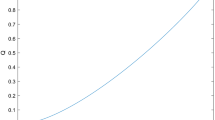Abstract
The Schmidt number is a fundamental parameter characterizing the properties of quantum states, and local projections are fundamental operations in quantum physics. We investigate the relation between the Schmidt numbers of bipartite states and their projected states. We show that there exist bipartite positive partial transpose entangled states of any given Schmidt number. We further construct the notion of joint Schmidt number for multipartite states and explore its relation with the Schmidt number of bipartite reduced density operators.
Similar content being viewed by others
References
Sanpera, A., Bruß, D., Lewenstein, M.: Schmidt-number witnesses and bound entanglement. Phys. Rev. A 63, 050301 (2001)
Dür, W., Vidal, G., Cirac, J.I.: Three qubits can be entangled in two inequivalent ways. Phys. Rev. A 62, 062314 (2000)
Terhal, B.M., Horodecki, P.: A schmidt number for density matrices. Phys. Rev. A 61, 040301 (2000)
Bennett, C.H., Divincenzo, D.P., Smolin, J.A., Wootters, W.K.: Mixed-state entanglement and quantum error correction. Phys. Rev. A 54, 3824–3851 (1996)
Chen, L., Đoković, D.Ž.: Description of rank four entangled states of two qutrits having positive partial transpose. J. Math. Phys. 52(12), 122203 (2011)
Chen, L., Đoković, D.Ž.: Distillability of non-positive-partial-transpose bipartite quantum states of rank four. Phys. Rev. A 94, 052318 (2016)
Chen, L., Li, Y.: Nonlocal and controlled unitary operators of Schmidt rank three. Phys. Rev. A 89, 062326 (2014)
Chen, L., Li, Y.: On the Schmidt-rank-three bipartite and multipartite unitary operator. Ann. Phys. 351, 682–703 (2014)
Chen, L., Li, Y.: Decomposition of bipartite and multipartite unitary gates into the product of controlled unitary gates. Phys. Rev. A 91, 032308 (2015)
Chen, L., Chitambar, E., Modi, K., Vacanti, G.: Detecting multipartite classical states and their resemblances. Phys. Rev. A 83, 020101 (2011)
Peres, A.: Separability criterion for density matrices. Phys. Rev. Lett. 77, 1413 (1996)
Cubitt, T., Montanaro, A., Winter, A.: On the dimension of subspaces with bounded schmidt rank. J. Math. Phys. 49, 2022107 (2008)
Bennett, C.H., Divincenzo, D.P., Mor, T., Shor, P.W., Smolin, J.A., Terhal, B.M.: Unextendible product bases and bound entanglement. Phys. Rev. Lett. 82, 5385–5388 (1999)
Gupta, V.P., Mandayam, P., Sunder, V.S.: The functional analysis of quantum information theory: a collection of notes based on Lectures by Gilles Pisier, K. R. Parthasarathy, Vern Paulsen and Andreas Winter. Lecture Notes in Physics 902. Springer International Publishing, 1st edn (2015)
Stormer, E.: Extension of positive maps into \(B({\cal{H}})\). J. Funct. Anal. 66, 235–254 (1986)
Itoh, T.: Positive maps and cones in \(C^*\)-algebras. Math. Jpn. 31, 607–616 (1986)
Eom, M.-H., Kye, S.-H.: Duality for positive linear maps in matrix algebras. Math. Scan. 86, 130–142 (2000)
Kye, S.-H.: Facial structures for various notions of positivity and applications to the theory of entanglement. Rev. Math. Phys. 25, 1330002 (2013)
Terhal, B.M.: Bell inequalities and the separability criterion. Phys. Lett. A 271, 319–326 (2000)
Yang, Y., Leung, D.H., Tang, W.-S.: All 2-positive linear maps from \(M_3({\mathbb{C}})\) to \(M_3({\mathbb{C}})\) are decomposable. Linear Algebra Appl. 503, 233–247 (2016)
Horodecki, M., Horodecki, P.: Reduction criterion of separability and limits for a class of distillation protocols. Phys. Rev. A 59, 4206 (1999)
Hughston, L.P., Jozsa, R., Wootters, W.K.: A complete classification of quantum ensembles having a given density matrix. Phys. Lett. A 183, 14 (1993)
Horodecki, M., Horodecki, P., Horodecki, R.: Separability of mixed states: necessary and sufficient conditions. Phys. Lett. A 223, 1–8 (1996)
Chen, L., Đoković, D.Ž.: Separability problem for multipartite states of rank at most 4. J. Phys. A Math. Theor. 46, 275304 (2013)
Eisert, J., Briegel, H.J.: Schmidt measure as a tool for quantifying multiparticle entanglement. Phys. Rev. A 64, 022306 (2001)
Nielsen, M.A., Chuang, I.L.: Quantum Computation and Quantum Information. Cambridge University Press, Cambridge (2000)
Terhal, B.M., Horodecki, P., Smolin, J.A., Thapliyal, A.V.: Rank two bipartite bound entangled states do not exist. Theor. Comput. Sci. 292, 589–596 (2003)
Cadney, J., Huber, M., Linden, N., Winter, A.: Inequalities for the ranks of multipartite quantum states. Linear Algebra Appl. 452, 153–171 (2014)
Zhu, H., Chen, L., Hayashi, M.: Additivity and non-additivity of multipartite entanglement measures. New J. Phys. 12, 083002 (2010). arXiv:1002.2511 [quant-ph]
Kyung Hoon Han and Seung-Hyeok Kye: Various notions of positivity for bi-linear maps and applications to tri-partite entanglement. J. Math. Phys. 57, 015205 (2016)
Acknowledgements
Lin Chen was supported by the NSF of China (Grant No. 11501024), and the Fundamental Research Funds for the Central Universities (Grant Nos. 30426401, 30458601 and 29816133). Yu Yang acknowledged financial support from Department of Mathematics, National University of Singapore, for his Ph.D. study. Wai-Shing Tang was partially supported by Singapore Ministry of Education Academic Research Fund Tier 1 Grant (No. R-146-000-193-112). The authors would like to thank Farid Shahandeh for his comments.
Author information
Authors and Affiliations
Corresponding author
Rights and permissions
About this article
Cite this article
Chen, L., Yang, Y. & Tang, WS. Schmidt number of bipartite and multipartite states under local projections. Quantum Inf Process 16, 75 (2017). https://doi.org/10.1007/s11128-016-1501-y
Received:
Accepted:
Published:
DOI: https://doi.org/10.1007/s11128-016-1501-y




